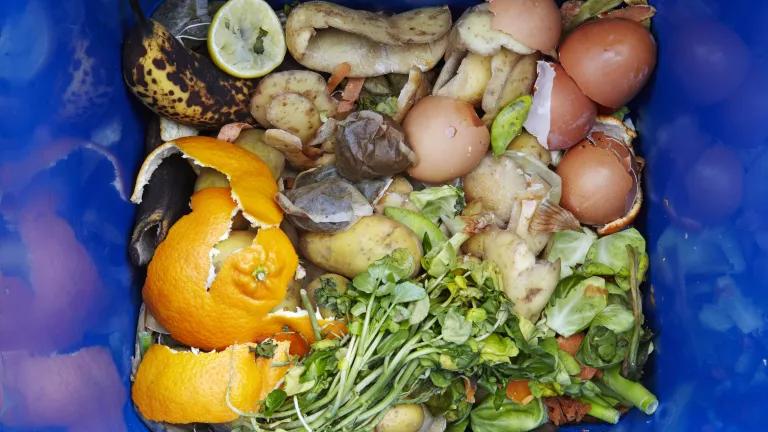Funding Food Waste Solutions in the Infrastructure Act
The investments in the Infrastructure Act geared towards food waste reduction can help achieve several benefits, including reduced climate emissions, healthier soils, and job creation.

Tackling food waste gives us a valuable opportunity to address interconnected climate, environmental, economic and social justice issues. Reducing the amount of food that goes to waste, redirecting surplus food, and recycling food scraps all help reduce the resource impacts of and the money spent on food that isn’t eaten. We all—residents, business owners, farmers and farmworkers—stand to gain from a less wasteful food system.
The Infrastructure Investment and Jobs Act (IIJA), signed into law in November 2021, includes $350M in investments over 5 years to transform municipal solid waste and recycling, including food waste reduction. Funding includes:
- $15M annually for five years to support municipal recycling education, including food scrap recycling education.
- $55M annually for five years to support improvements to local waste management systems, including local organics management.
According to EPA’s Fact Sheet, the investments will:
- Support implementation of EPA’s National Recycling Strategy
- Provide grants to improve local materials management, like organics management
- Assist local waste management authorities in making improvements to their waste management systems
- Help state, local and Tribal governments improve education and outreach on how to recycle right, as well as provide a model recycling program toolkit
- Help implement EPA's Comprehensive Procurement Guidelines for federal purchases and
- Assist schools with recycling curricula
Addressing food waste and recycling food scraps are key to improving municipal solid waste management. The investments in the Infrastructure Act geared towards food waste reduction can help achieve several benefits, including reduced climate emissions, healthier soils, and job creation.
Key opportunities to prioritize food waste reduction in the IIJA include:
- Ensuring that educational materials for residents about municipal recycling programs include information about how to prevent food from going to waste in the first place. This includes messaging about proper storage of foods, deciphering date labels, meal planning, and recipe development.
- Investing in tools to measure the amount of food waste generated, including the amount that could have been eaten or donated, to ensure that we are not overbuilding composting and other food scrap recycling infrastructure. By accounting for strategies to prevent food waste and redirect surplus food, we can ensure that less food waste is sent to food scrap recycling facilities which is less of a burden on local infrastructure.
- Supporting small- and medium-scale community composting projects run by local organizations – they build neighborhood resiliency, create jobs, restore depleted soils, and offer composting options to residents who might not have access to another food scrap recycling program.
- Supporting investments in large-scale food scrap recycling infrastructure that can process substantial amounts of organic material, better equipping cities to roll out citywide food scrap collection programs and generate compost products which can be used to improve soil health.
- Incentivizing approaches that take an intersectional approach to food waste, simultaneously addressing social, economic, racial, health, and environmental/climate impacts. As stated in the IIJA language, “In developing application requirements for this pot of funding, the EPA Administrator may request that applicants provide a description of how the funds will support disadvantaged communities, among other things.” An intersectional approach can be directly incentivized through funding mechanisms, such as:
- Funding a range of solutions and community-based partners, recognizing that local knowledge around needed solutions will best meet the unique needs of communities.
- Focusing resources in specific geographies and communities that bear the biggest injustices. For example, in communities that have waste incinerators nearby.
- Prioritizing targets and impacts beyond GHG reductions, like increased food security, and offering assistance in measuring those economic, social and environmental benefits.
Including support for local governments to address food waste in the IIJA means more people will be empowered to better maximize their food in their homes, and will have access to food scrap recycling locally, yielding healthier soils in our yards, our parks, and our farms. The cities we work with through the NRDC Food Matters Initiative have long driven food waste reduction efforts at the local level, and the support that the IIJA could afford to them and to other local governments that want to follow their lead will be invaluable for advancing their efforts. Sustained and substantial funding like the IIJA funding is essential to equipping cities to achieve their long-term climate goals, along with a host of other environmental, economic, and social benefits.





